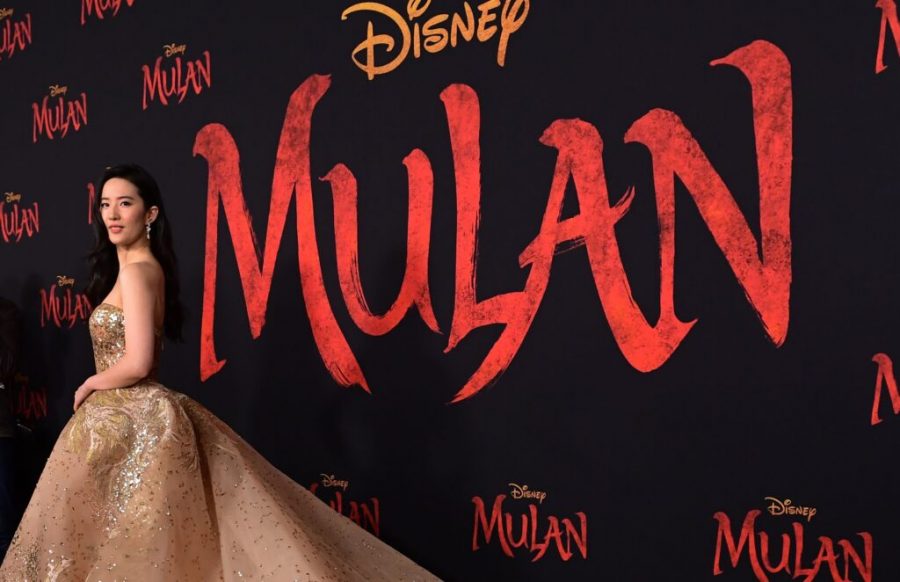The controversy surrounding Mulan, Disney’s beloved Chinese heroine
Disney’s Mulan remake was problematic and poorly executed, resulting in millions of dollars lost and numerous angry viewers
More stories from Maya Shah
Photo by Frederic J. BROWN/ AFP via Getty Images)
Disney’s Mulan remake was an exceedingly popular topic of conversation this year, but for all the wrong reasons. While it was once largely anticipated by Disney fans, when details were revealed about what happened behind the scenes, the film’s problematic nature was exposed. The mistakes made by Disney regarding this film were distasteful and emphasized that most of their promises to people of color are purely superficial.
The controversy started when the lead actress, Liu Yifei, playing the part of Hua Mulan, posted her support for the Hong Kong police during the widespread government protests taking place. On the Chinese social media platform Weibo, Yifei shared a quote from the Chinese Communist Party’s official newspaper, reading “I support the Hong Kong police. You can beat me up now.”
Her stance on how the protests were unjustified and a shame was revealed to the public. Shortly after, #boycottmulan began trending on Twitter and other social media platforms. Many did not want to support an actress who would side with brutal crackdowns on peaceful demonstrations. However, some argued that not all the demonstrations had been peaceful and she has every right to voice her opinion. The backlash received was not an attack on her freedom of speech. Everyone is entitled to share their views, just as everyone is entitled to not pay for a movie where a cast member supports something that they deem unjust.
“It is so sad since Liu Yifei is playing Mulan, a character that stands against oppression and violence,” junior Danny Cen said.
The filming of the movie has emphasized Disney’s complacency in human rights abuses. Parts of Mulan were shot in the Xinjiang region of China, which is where it is believed that Uyghur Muslims have been detained in oppressive concentration camps. The Chinese government has repeatedly denied the existence of the detention camps and states that they are “re-education” facilities. There have been interviews conducted with camp survivors by Reuters who have detailed the many abuses they faced there, including torture.
The British Broadcasting Corporation (BBC) has investigated and found evidence of detention centers in the deserts of Xinjiang. The choice to film there was hypocritical. Just last year, Disney chief executive Bob Iger said that if the fetal heartbeat bill, which prohibits abortions once a heartbeat can be detected, was passed in Georgia it would be difficult for Disney to film there anymore. Since Disney has before threatened to boycott areas to film due to injustice, it is strange how they could so easily turn a blind eye to the suffering happening in the Xinjiang region.
Disney promised the Mulan remake would be authentic to the original Chinese legend it was based on and would showcase a more cultural side of China than the animated version had. This announcement was made to captivate audiences in China. Mulan was the first Disney movie to feature an all-Asian cast, yet screenwriters, producers, costume designers and directors were mostly white Americans. It is hard to preach about the authenticity of the remake when not one person of Chinese descent was working on the production team for the film. The lack of diversity behind the scenes shows how the pledge to honor Chinese culture through the film was only used to draw in more Chinese viewers.
“If Disney had hired an off-screen Chinese team to execute the movie, I feel like [the movie] would have turned out better or at least received less backlash,” Cen said.
Many memorable characters from the original animation had been cut to fit a more traditional atmosphere, including Li Shang. Though it was never made official, Li Shang was speculated to be bisexual due to his obvious attraction to Mulan even when he believed she was a man. During the 1990s, this was one of the first positive portrayals of a bisexual character and Li Shang has largely been known as an iconic character for members of the LGBTQ+ community. When it was announced that his character was being cut, disappointment spread over the LGBTQ+ community throughout social media who had praised this monumental character in their fight for social equality.
The budget to make Mulan was $200 million dollars, yet it only generated $64.4 million at the box office, leading to a loss of $135.6 million for Disney. The detrimental loss of profits was well deserved. From the political controversy, hypocrisy and lack of representation, the Mulan remake was destined to fall below the mark.
Your donation will support the student journalists of Coral Gables Senior High School. Your contribution will help us cover our annual website hosting costs.


